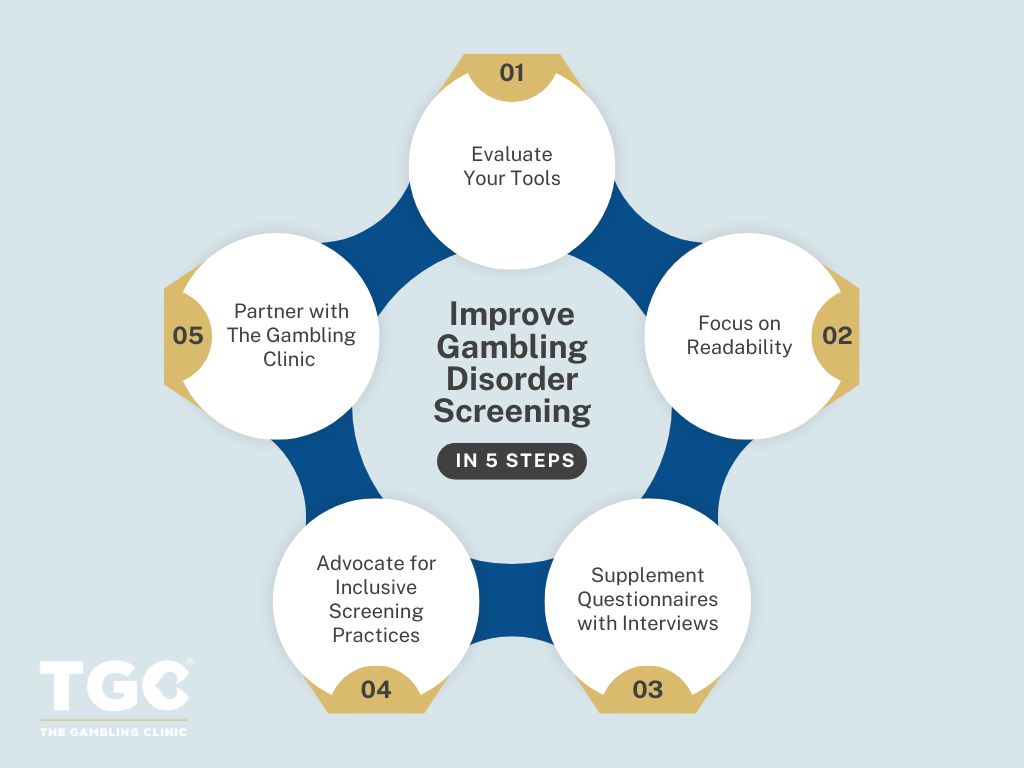Screening tools are essential for identifying gambling disorders and forming the foundation for effective treatment plans and early interventions. But are these tools really doing their job? A recent study by Peter, Whelan, and Pfund (2022) revealed a surprising truth: many screening tools might not be as reliable as we think.
The study uncovered a key issue: how a tool is designed can significantly impact its accuracy. When questions are too complicated or use language that’s difficult to understand, the risk of misdiagnosis rises, particularly for individuals with less formal education. This doesn’t just skew the data; it leaves real people—people who need help—at risk of slipping through the cracks.
For providers, this raises an important question: Are the tools we rely on truly inclusive and effective? If not, it’s time to rethink how we approach screening to ensure that every patient has an equal chance to be heard, understood, and supported.
In this article, we’ll cover the challenges these tools face and how we, as providers, can create a more accurate and inclusive path to diagnosing gambling disorders.
Challenges in Gambling Disorder Screening
Screening for gambling disorders isn’t just about identifying symptoms—it’s about ensuring every individual has the opportunity to be accurately assessed, regardless of their background or circumstances. However, several challenges can undermine this process, leaving some individuals undiagnosed and untreated.
Here’s a closer look at the hurdles providers face when using common screening tools—and why addressing them matters.
1. Readability Barriers
For many patients, completing a gambling disorder screening can feel overwhelming. The questions are often filled with complicated language, long sentences, or phrasing that’s difficult to follow. Instead of feeling supported or understood, they’re left confused, second-guessing their answers, and wondering if they’re giving the “right” response. This confusion can create a barrier to accurate diagnosis, leaving patients feeling frustrated and unseen.
Studies, such as the one by Peter, Whelan, and Pfund (2022), highlight how readability issues can significantly impact the accuracy of responses. Tools like the National Opinion Research Center DSM-IV Screen for Gambling Problems (NODS) often use:
- Long sentences: Packed with “or” and “and” clauses that are hard to follow.
- Advanced vocabulary: Words that are more familiar in academic or clinical settings than in everyday conversations.
These factors can make the difference between providing accurate information and unintentionally misrepresenting symptoms for individuals with lower educational attainment. The study showed that participants with lower education levels consistently struggled more with comprehension, leading to incomplete or incorrect responses.
When screening tools aren’t designed to meet patients where they are, it’s not just a missed diagnosis—it’s a missed opportunity to provide care.
2. Over-Reliance on Self-Reporting
Self-report questionnaires are a key part of gambling disorder screenings. They’re simple to use and allow patients to describe their experiences in their own words. However, there’s a potential downside: these tools rely entirely on how well patients understand the questions and how honestly they view their own behavior.
When a question is misunderstood, the consequences can include:
- Underreporting symptoms: A patient might not realize a behavior qualifies as problematic.
- Overreporting symptoms: Ambiguous language can make normal behavior seem pathological.
- Delays in treatment: Misdiagnoses can mean patients don’t get the help they need or receive treatment that doesn’t fit their actual situation.
While self-reporting is a valuable tool, it works best when paired with well-designed questions and supplemented by professional assessments.
3. A Lack of Cultural and Linguistic Adaptation
Screening tools often take a one-size-fits-all approach, assuming that a single set of questions will resonate with everyone. But gambling behaviors—and how people understand and talk about them—are deeply influenced by culture, language, and lived experience.
When tools fail to account for these differences, they risk alienating or misdiagnosing individuals. For example:
- Cultural relevance: Certain gambling behaviors might be more or less stigmatized in different communities, affecting how people respond to questions.
- Language alignment: Phrasing that feels natural to one group might seem confusing or irrelevant to another.
These gaps can lead to lower engagement with the screening process, incomplete responses, and diagnostic inaccuracies.
Why These Challenges Matter
These barriers to accurate gambling disorder screenings have far-reaching consequences that affect not only individuals but also their families, communities, and society as a whole.
For Individuals:
When gambling disorders go undiagnosed, individuals continue to struggle. The lack of accurate identification often leads to worsening financial instability, strained relationships, and declining mental health. Many may also face feelings of shame or isolation, believing that their challenges are a personal failing rather than a diagnosable condition that can be treated. Without effective screening tools, these individuals are left without the help they need to regain control of their lives.
For Families:
The impact of undiagnosed gambling disorders often extends to family members and loved ones. Financial hardships caused by excessive gambling can lead to mounting debts, eviction, or even bankruptcy, placing a heavy burden on families. Relationships become strained as trust erodes, and the emotional toll of living with someone with an untreated gambling problem can lead to anxiety, depression, or resentment among family members.
For Communities:
The ripple effects of undiagnosed gambling disorders can also disrupt communities. Increased financial instability and social isolation often result in higher rates of homelessness, unemployment, and crime. The economic costs of untreated gambling disorders—such as healthcare expenses, legal issues, and lost productivity—add up quickly, straining public resources and community support systems.
For Society:
On a broader scale, untreated gambling disorders can lead to significant economic and social costs. Governments and healthcare systems may face increased demand for services, including emergency interventions, legal proceedings, and mental health treatment. Additionally, the stigma associated with gambling disorders often prevents individuals from seeking help, perpetuating cycles of harm that could otherwise be interrupted through early diagnosis and intervention.
Insights from the Memphis Gambling Screen (MGS)
The Memphis Gambling Screen (MGS) was specifically created to improve readability and accessibility, addressing many of the common issues with traditional screening tools. Here’s what sets the MGS apart:
Simplifying Language
The MGS reworked complex phrasing to make questions easier to understand. For instance, “…serious or repeated problems…family members or a friend?” was simplified to “Has your gambling caused problems with people that you care about?” This shift reduced cognitive overload, allowing respondents to focus on their answers without struggling to interpret the question.
Iterative Testing with Target Groups
To ensure clarity and relatability, the MGS underwent rigorous pilot testing with individuals from disadvantaged backgrounds. Feedback from these groups shaped the final design, making the tool more inclusive and effective for diverse populations.
Enhanced Accuracy
The MGS performed better than other tools, such as the National Opinion Research Center Diagnostic Screen (NODS). Participants using the MGS accurately identified 81% of diagnostic criteria for gambling disorder, compared to 69% with the NODS. This improvement highlights the critical link between a tool’s readability and its production of reliable results.
By focusing on simplicity, inclusivity, and accuracy, the MGS clearly demonstrates how thoughtful design can make screening tools more effective and equitable.

Improving Gambling Disorder Screening: Actionable Strategies for Providers
Evaluate Your Screening Tools
Consider the following:
- Is the language in the screening tool clear and accessible?
- Has the tool been validated with diverse populations?
If the answer to either question is “no,” you should reconsider your approach and explore alternatives like the Memphis Gambling Screen (MGS), which prioritizes readability and inclusivity.
Focus on Readability
Utilize readability-focused tools to refine your screening questionnaires:
- Coh-Metrix: This tool analyzes sentence complexity and overall syntactic structure in a text. It evaluates factors like sentence length, word choice, and grammatical simplicity, helping identify areas where language might be too challenging for patients with varying literacy levels. By simplifying complex sentences, Coh-Metrix ensures that questions are more accessible and less intimidating.
- QUAID (Question Understanding Aid): QUAID is designed to pinpoint questions that may confuse respondents or overload their working memory. It identifies issues such as ambiguous phrasing, double negatives, or excessive cognitive demands. By addressing these problems, QUAID helps ensure that each question is straightforward and easy to understand, reducing the risk of misinterpretation.
Supplement Questionnaires with Interviews
Self-report questionnaires alone may miss important details. Structured interviews provide an opportunity to explore a patient’s symptoms and context in greater depth, offering a more comprehensive view of their experiences.
Advocate for Inclusive Screening Practices
Work with organizations to ensure screening tools are adaptable for:
- Non-English-speaking populations.
- Individuals with limited literacy skills.
- Culturally specific gambling behaviors.
The Role of Education in Screening Success
Peter et al. (2022) found that individuals with lower education levels were 16% less likely to answer screening questions accurately compared to college-educated respondents. This highlights the importance of tailoring tools to meet the needs of all patients, regardless of educational background.
Resources Provided by The Gambling Clinic for Healthcare Providers
At The Gambling Clinic, we recognize the critical role healthcare providers play in identifying and addressing gambling disorders. To support providers in their efforts, we offer a range of resources designed to make screening, diagnosing, and referring patients as seamless and effective as possible.
Comprehensive Gambling Disorder Screening Tools
Providers can access the Memphis Gambling Scale (MGS), a validated tool designed to help identify patients struggling with gambling disorders. These resources enable healthcare professionals to ask open-ended, non-stigmatizing questions that foster productive conversations about gambling behaviors.
Guides for Recognizing Gambling Disorder Risk Factors
Our clinic provides educational materials that outline the key risk factors and symptoms of gambling disorders. These include:
- Co-occurring conditions such as depression, anxiety, or substance use.
- Impacts on financial stability, relationships, and professional life.
- Demographic and behavioral risk factors, such as age, impulsivity, or family history.
These resources equip providers to better understand the challenges their patients may be facing and confidently address gambling-related concerns.
Referral Support
We make it easy for healthcare providers to connect their patients with expert care. Providers can refer patients in Tennessee to The Gambling Clinic, knowing that financial barriers will not prevent treatment. We offer flexible payment plans and waived fees for those in need. Additionally, we encourage providers to collaborate with us, ensuring they stay informed about their patients’ progress and treatment outcomes.
Education and Training for Providers
We provide educational resources to help providers stay informed about the latest research and best practices in treating gambling disorders. Our training includes strategies for discussing gambling concerns with patients, understanding the stages of change, and fostering trust to encourage treatment acceptance.
Ongoing Support and Consultation
Providers are welcome to contact The Gambling Clinic for guidance on managing patient care, even if their patients choose not to pursue treatment immediately. Our team is here to assist providers in navigating the complexities of gambling addiction and supporting their patients through every stage of the recovery journey.
Conclusion
Healthcare providers are often the first line of defense in identifying gambling disorders, making their role essential to patient recovery. By partnering with The Gambling Clinic, providers gain access to trusted tools, resources, and expertise to ensure their patients receive the care they need. Together, we can reduce the stigma surrounding gambling addiction and make meaningful strides in addressing this growing public health issue.





